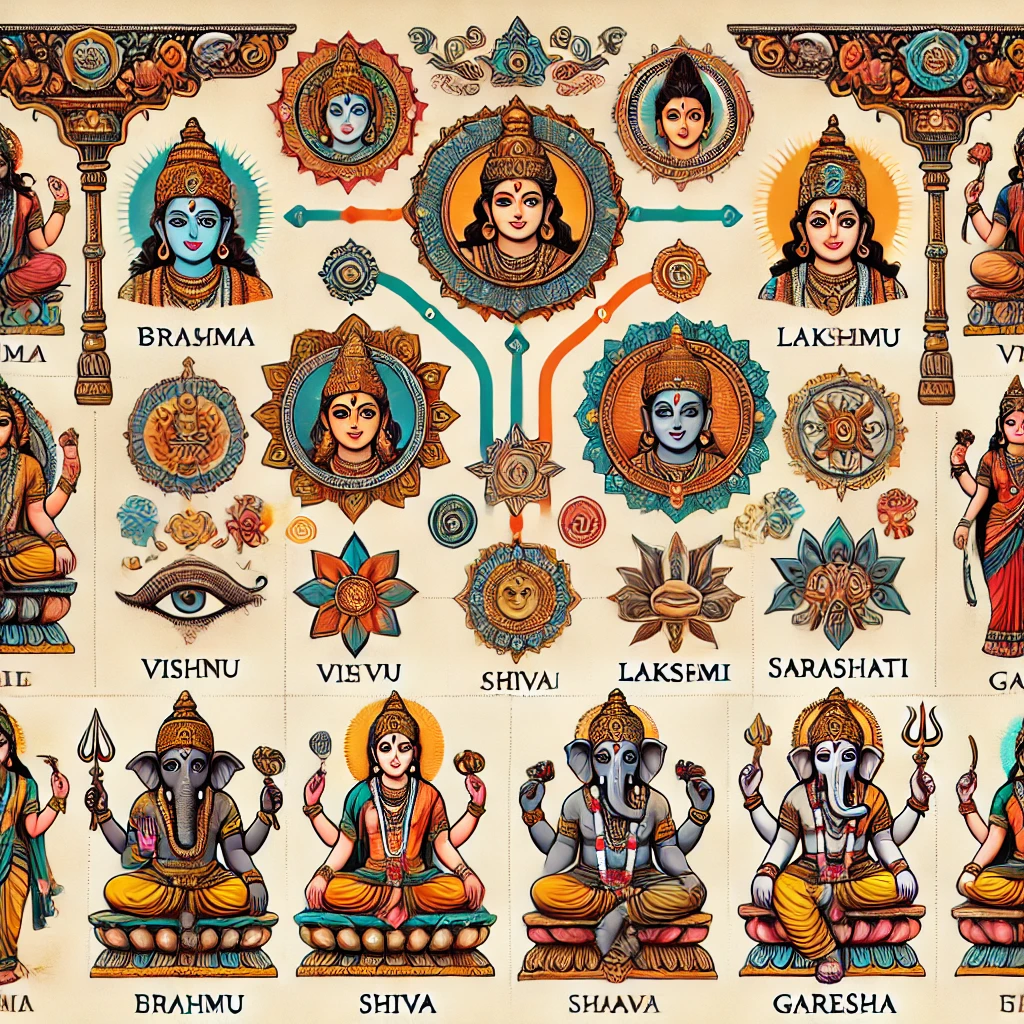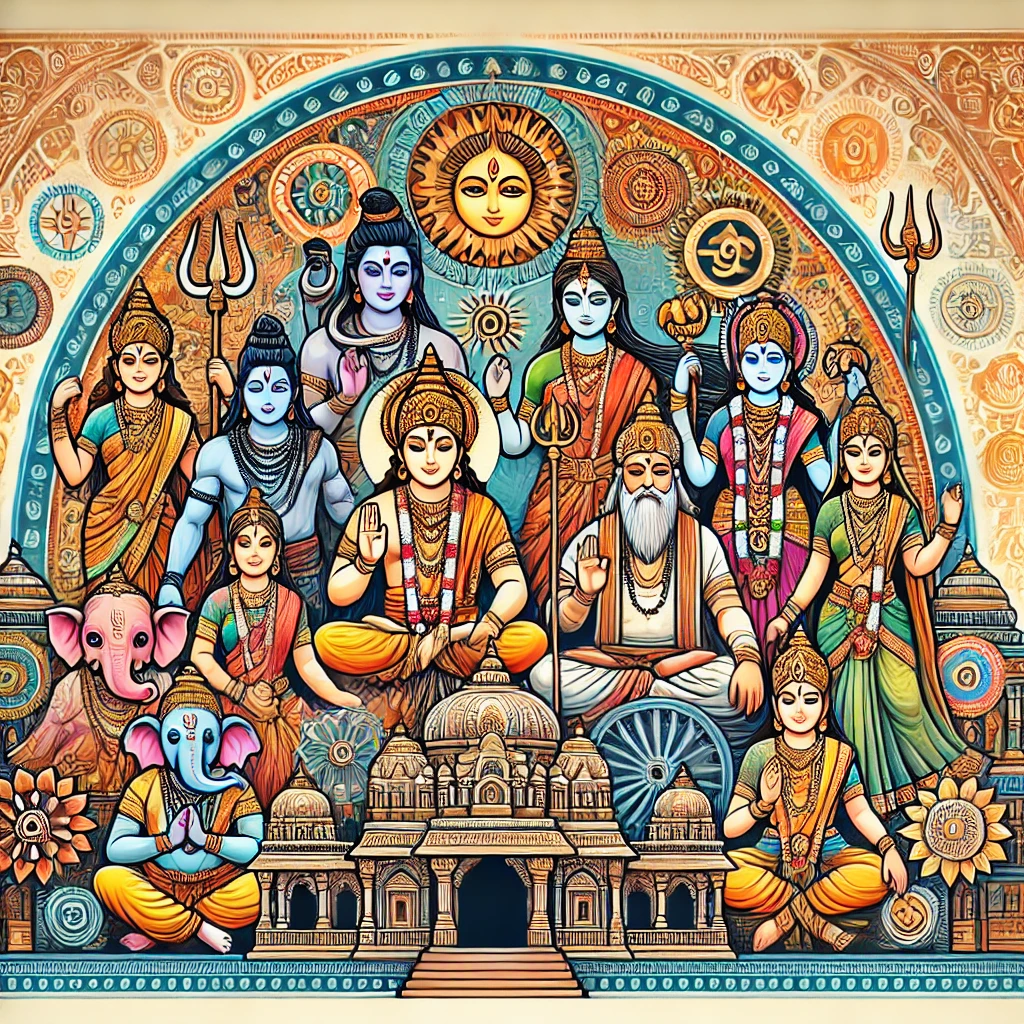
The Hindus religion is one of the world’s oldest faiths, with a history that spans over 4,000 years. A distinctive feature of Hinduism is its polytheistic nature, meaning that followers worship multiple gods and goddesses. This often raises the question: why do adherents of the Hindus religion worship so many gods? The answer lies in the religion’s philosophy, history, and cultural evolution. This article explores the reasons behind the multitude of deities in Hinduism and how they contribute to a unified spiritual vision.
Table of Contents
What Is the Hindus Religion?
The Hindus religion, commonly referred to as Hinduism, is a complex and diverse faith with no single founder or a unified system of beliefs. It encompasses a wide range of philosophies, practices, and traditions. Central to Hinduism is the belief in a supreme reality called Brahman, which manifests in numerous forms, gods, and goddesses. These deities represent different aspects of life, nature, and the cosmos, offering followers various paths to spiritual fulfillment.
Reasons Why the Hindus Religion Worships Many Gods
1. Diversity in Unity
Hindus religion embraces the concept of diversity in unity. While it recognizes the existence of a single supreme reality (Brahman), it also acknowledges that humans have different personalities, needs, and spiritual inclinations. The multiple gods and goddesses are seen as various expressions of that one ultimate reality, allowing devotees to choose the deity that resonates most with their personal and spiritual needs.
2. Symbolism and Representation
In the Hindus religion, gods and goddesses are often symbolic representations of natural forces, virtues, and aspects of life. For instance, Ganesha is the god of wisdom and the remover of obstacles, while Lakshmi symbolizes wealth and prosperity. Worshiping specific deities allows followers to focus on and cultivate the qualities or blessings associated with those gods.
3. Mythology and Stories
The Hindu pantheon is rich with stories and legends. Each deity in Hindu mythology has a unique narrative, which conveys moral lessons, philosophical ideas, and cultural values. These stories are often recited during religious festivals and rituals, making them an integral part of everyday life and spiritual practice in Hinduism.

4. Regional and Cultural Differences
The Hindus religion is highly adaptable, allowing local and regional traditions to incorporate their own gods and goddesses. Different parts of India, and even the Indian diaspora, might worship distinct deities based on local culture, history, and the natural environment. This regional diversity enriches Hinduism, making it a living and evolving tradition.
5. The Concept of Ishta Devata
In Hinduism, there is a concept called Ishta Devata, which means “chosen deity.” Devotees are free to select their preferred god or goddess as their personal focus of devotion. This personal connection allows Hindus to form an intimate relationship with their deity, fostering a deep sense of spirituality.
6. Paths to Salvation: Bhakti, Karma, Jnana, and Raja
Hinduism provides multiple paths to spiritual liberation (known as Moksha). Different gods are often associated with different spiritual paths:
- Bhakti Yoga (Path of Devotion): Focused on worship and love for a particular deity.
- Karma Yoga (Path of Action): Involves selfless service and duty.
- Jnana Yoga (Path of Knowledge): Emphasizes wisdom and the realization of self.
- Raja Yoga (Path of Meditation): Centers on discipline and meditation.
The variety of gods allows Hindus to pursue spirituality through the path that suits them best.
Major Gods and Goddesses in the Hindus Religion
Below is a table highlighting some of the major deities in the Hindus religion, along with their roles and significance:
| Deity | Role/Domain | Symbolism | Popular Regions |
|---|---|---|---|
| Brahma | Creator of the Universe | Creation, Knowledge | Pan-Indian |
| Vishnu | Preserver and Protector | Protection, Compassion | Northern India, Vaishnavism |
| Shiva | Destroyer and Transformer | Transformation, Meditation | Pan-Indian, Shaivism |
| Lakshmi | Goddess of Wealth and Prosperity | Abundance, Fortune | Southern India, Vaishnavism |
| Saraswati | Goddess of Wisdom and Arts | Knowledge, Music, Learning | Pan-Indian, Educational Institutions |
| Durga | Warrior Goddess, Protector of Dharma | Strength, Protection | Eastern India, Festivals like Durga Puja |
| Ganesha | Remover of Obstacles | Wisdom, New Beginnings | Maharashtra, Across India |
| Hanuman | Devotee of Lord Rama | Devotion, Strength | Northern and Central India |
| Krishna | Avatar of Vishnu, Divine Lover | Love, Compassion, Duty | Northern India, ISKCON Movement |
| Rama | Avatar of Vishnu, Ideal King | Righteousness, Morality | Northern and Southern India |
Conclusion
The Hindus religion, with its vast pantheon, offers a unique approach to spirituality that emphasizes diversity, symbolism, and personal choice. The many gods in Hinduism represent different facets of a single reality, making the faith inclusive and adaptable to individual and regional needs. This diversity is not a sign of division but rather a testament to Hinduism’s ability to address the varied spiritual needs of humanity. For those exploring or practicing the Hindus religion, the worship of multiple gods offers a rich and multifaceted spiritual experience that caters to the inner needs of the soul.
FAQs About the Hindus Religion
1. Do Hindus believe in one God or many gods?
Hindus believe in a single ultimate reality (Brahman), which manifests in many forms, gods, and goddesses. Thus, the religion can be both monotheistic and polytheistic depending on one’s interpretation.
2. Why are there so many gods in Hinduism?
The multitude of gods in Hinduism reflects the religion’s inclusiveness, regional diversity, symbolism, and different approaches to spirituality. Each god represents a unique aspect of life or nature.
3. Is it necessary for Hindus to worship all gods?
No, Hindus are free to choose their personal deity (Ishta Devata) for devotion. They are not required to worship all gods but can honor any deity that resonates with them spiritually.
Final Thoughts
The concept of many gods in the Hindus religion highlights its flexibility and acceptance of various spiritual paths. This open-minded approach allows individuals to engage with the divine in a way that aligns with their own values, beliefs, and circumstances, making Hinduism one of the most diverse and profound religions in the world.
For more information visit our site: https://xiel.online/






